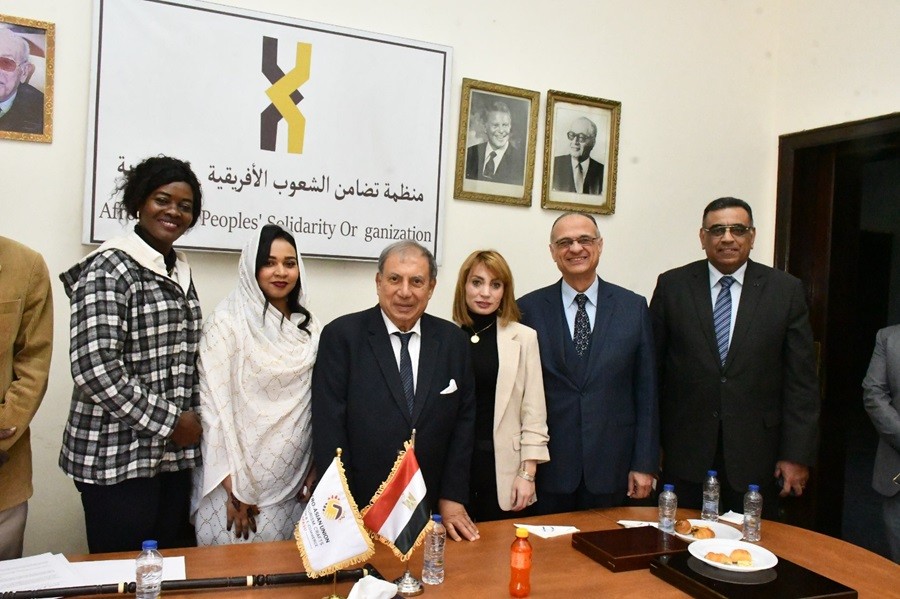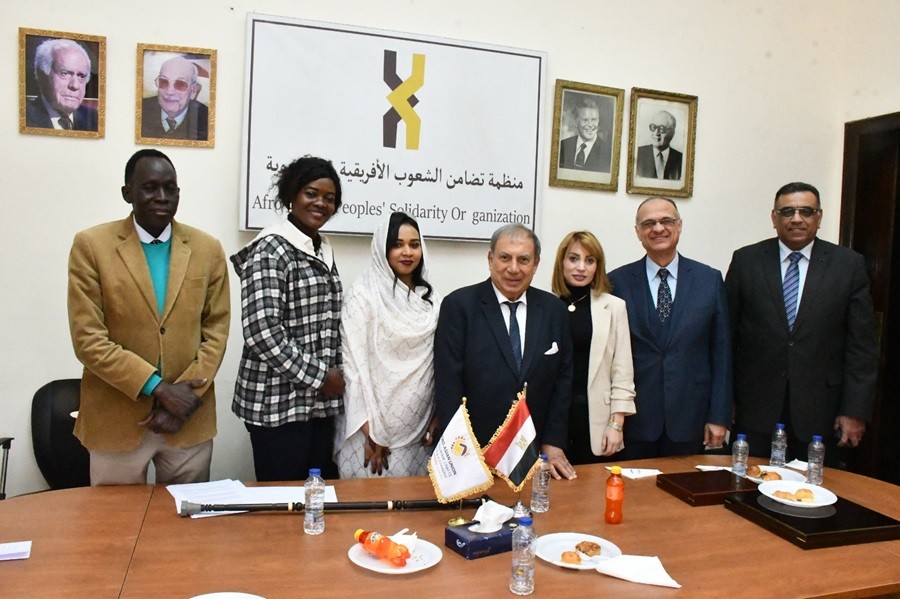- African-Asian UNION (AFASU)
The African Asian Union (AFASU) organizes an international symposium on the occasion of the 65th anniversary of the founding of the union’s parent organization

The African Asian Union (AFASU) organizes an international symposium on the occasion of the 65th anniversary of the founding of the union’s parent organization, the African-Asian Peoples’ Solidarity Organization (AAPSO).
The African Asian UNION A for Development, Tourism and Technology (AFASU), headed by Dr. Hossam Darwish, organized a symposium on the occasion of the 66th anniversary of the establishment of the Afro-Asian Peoples’ Solidarity Organization (AAPSO), to which the UNION is affiliated. This organization was established by the late President Gamal Abdel Nasser following the Bandung Conference held by the Non-Aligned Countries. The organization was headed by the President The late Anwar Sadat, the artist Salah Zulfikar, and a number of prominent political and cultural figures such as Dr. Ambassador Murad Ghaleb, Dr. Ahmed Hamroush, the great writer Abdel Rahman Al-Sharqawi, and others, until the current president of the organization, Dr. Helmy Al-Hadidi, the former Minister of Tourism.
It is known that the organization is international. The Headquarters State Treaty was signed in the Arab Republic of Egypt in 1957, where the agreement was signed and more than ninety countries from all over the Afro-Asian and European world, Latin American countries, and Russia joined the organization.
The symposium was attended by all the leaders of the African-Asian Union (AFASU), all the leaders of the Afro-Asian Peoples' Solidarity Organization, a large number of media figures, international, local and Arab news agencies, and a number of guests of honor.
His Excellency Dr. Al-Hadidi said that what is happening on the Palestinian territories these days is more than a disaster, and greater than a war of genocide. The Palestinian people did not witness such a war even in the Nakba of 1948, and that the attack is not limited to Gaza, but rather in the West Bank and Jerusalem as well. Al-Hadidi called for the necessity of... Stop these massacres immediately. One hundred days of violations and overthrow of all military standards of war and international laws are enough. What is happening now is a war crime that the entire world must unite against.
Dr. Helmy Al-Hadidi added that the Afro-Asian Peoples' Solidarity Organization is a popular organization that works in the interest of the state and within the framework of its policy. It tries by all means to encourage and confirm solidarity between Asia and Africa. In other words, the state must benefit from it because if it receives attention, it will grow and grow.
After the end of the colonial period, the organization developed its vision and goals and began working on Afro-Asian integration in all fields, whether economic, investment, commercial, agricultural, industrial and tourism.
And achieving the goals of sustainable development. Therefore, the organization established specific, specialized federations to be its auxiliary executive arms, including the African Asian Federation for Development, Tourism and Technology (AFASU), which is a very active union headed by Dr. Hossam Darwish, who organizes this symposium under the auspices of the parent organization.
The great journalist, Mr. Nizar Al-Khaled, the acting Secretary-General of the organization and the Secretary-General of the Afro-Asian Journalists Union, called at the beginning of his speech to recite Al-Fatihah for the souls of the martyrs of Gaza, the victims of this barbaric war on the Palestinian territories. Al-Khaled also reminded the attendees of the anniversary of the passing of the great martyr writer, Dr. Youssef Al-Sibai. On the occasion of the anniversary of his passing, he played a vital role in supporting the organization, especially his period of work in it, which ended with his martyrdom on his way to achieving more of its successes. Nizar Al-Khaled confirmed that he is proud of the African-Asian Union (AFASU), given that the union’s reputation is wonderful and international. He even learned about the union’s activities and Dr. Hossam Darwish from Yemen from one of the distinguished ministers.

Major General Ahmed Abdullah, the former governor of the Red Sea, also confirmed, after mentioning the history of the organization since its inception, that it was headed by great Egyptian men, the first of whom was the late President Mohamed Anwar Sadat.
It is self-evident that the organization strives to keep pace with the times, use the latest means of technology, digital transformation, and renew its discourse with changing political, economic, and social circumstances and positions. This is what the current president of the organization is making every effort to accomplish, even if financial matters hinder this progress and despite the great boom it has created. Specific unions are important executive arms, but the organization still suffers from weak resources.
In addition to the weakness of resources, they hinder any attempt at change, and what the federations emanating from the organization are currently doing contributes, albeit a little, to the return of the organization’s name again.
There is no doubt about the presence of the organization and its headquarters in Cairo, with its headquarters in Manial Ali. The eastern character of the Nile adds to Egypt's soft power and strengthens its voice in African and Asian forums and at the world level.
As for Dr. Adel Al-Muslimani, CEO of the Union, he said that the most prominent obstacles standing in the way of these efforts are, firstly, that we are a popular organization and that the popular organizations in our country are weak and do not receive sufficient support from their countries and do not have sources of funding to rely on, and secondly that we lack the support and cooperation of our countries in order to Achieving our goals. We call on member states to support the organization to continue achieving its goals.
Major General Hossam Badr El-Din, Secretary-General of the African Asian Union (AFASU), confirmed that it is self-evident that the organization strives to keep pace with the times and use the latest means of technology, digital transformation, and renew its discourse with changing political, economic and social circumstances and positions, which is what the current president of the organization is making every effort to accomplish, even if it is... Financial matters hinder this progress, and despite the great boom that the specific unions have brought about, as they serve as important executive arms, the organization still suffers from weak resources, which prevents any attempt at change, and that what the unions emanating from the organization are currently doing contributes, albeit to a small extent, to the return of Name of the organization again.
Dr. Hossam Darwish, President of the African-Asian Union, added that the Afro-Asian Peoples’ Solidarity Organization represents one of the most dangerous tools of Egypt’s soft power, and the leadership in the Arab Republic of Egypt must carefully reconsider its position on the Afro-Asian Peoples’ Solidarity Organization, as this historical edifice must be supported. Maintaining its employees and protecting the Afro-Asian solidarity file from being removed from the list of concerns of the Arab Republic of Egypt and the Egyptian Ministry of Foreign Affairs under the pretext of saving is a very, very big risk, which means amputating an important arm of Egyptian foreign policy, even though maintaining this arm (and working to strengthen it) is a small cost. Extremely and less than a little.
The great journalist, Osama Saraya, former editor-in-chief of Al-Ahram and honorary president of the African-Asian Journalists Union, added: There is no doubt that the presence of the organization in Cairo, with its headquarters located on the eastern bank of the Nile, adds to Egypt’s soft power and strengthens its voice in African and Asian popular forums and at the global level.
The spirit of Bandung was a source of inspiration for the peoples of Africa and Asia to push national liberation movements, especially in Africa, which led to the holding of the international conference in Cairo in December 1957 announcing the establishment of the Afro-Asian Peoples’ Solidarity Organization. The initiative came from the Indian Solidarity Organization, headed by Srimathi Rameswari Nehru, which visited Cairo, at the head of a delegation from the Indian organization. The delegation met with President Abdel Nasser, and they agreed to establish the Afro-Asian Peoples’ Solidarity Organization, with its headquarters in Cairo. The spirit of Bandung did not stop at the founding of this organization, but rather continued until it succeeded in the first Belgrade Conference of Governments of Developing Countries in order for a new force to be born there under the name of the Non-Aligned Movement.
At the end of the symposium, the African-Asian Union for Development, Tourism and Technology (AFASU) honored Professor Dr. Helmy Al-Hadidi, President of the Afro-Asian Peoples’ Solidarity Organization, and was awarded the AFASU Gold Award for leading the process of African-Asian solidarity. Professor Osama Saraya was also honored for winning the AFASU Gold Award for Outstanding Journalistic Contributions.
 العربية
العربية
